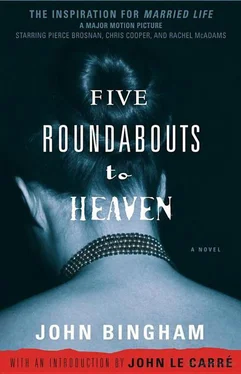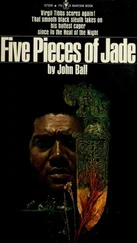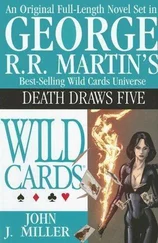John Bingham - Five Roundabouts to Heaven
Здесь есть возможность читать онлайн «John Bingham - Five Roundabouts to Heaven» весь текст электронной книги совершенно бесплатно (целиком полную версию без сокращений). В некоторых случаях можно слушать аудио, скачать через торрент в формате fb2 и присутствует краткое содержание. Жанр: Криминальный детектив, на английском языке. Описание произведения, (предисловие) а так же отзывы посетителей доступны на портале библиотеки ЛибКат.
- Название:Five Roundabouts to Heaven
- Автор:
- Жанр:
- Год:неизвестен
- ISBN:нет данных
- Рейтинг книги:4 / 5. Голосов: 1
-
Избранное:Добавить в избранное
- Отзывы:
-
Ваша оценка:
- 80
- 1
- 2
- 3
- 4
- 5
Five Roundabouts to Heaven: краткое содержание, описание и аннотация
Предлагаем к чтению аннотацию, описание, краткое содержание или предисловие (зависит от того, что написал сам автор книги «Five Roundabouts to Heaven»). Если вы не нашли необходимую информацию о книге — напишите в комментариях, мы постараемся отыскать её.
Five Roundabouts to Heaven — читать онлайн бесплатно полную книгу (весь текст) целиком
Ниже представлен текст книги, разбитый по страницам. Система сохранения места последней прочитанной страницы, позволяет с удобством читать онлайн бесплатно книгу «Five Roundabouts to Heaven», без необходимости каждый раз заново искать на чём Вы остановились. Поставьте закладку, и сможете в любой момент перейти на страницу, на которой закончили чтение.
Интервал:
Закладка:
Bartels glanced round the room. He said:
“I remember I once said to her, years ago now, and in joking tones: “I think you only married me because I was the best financial bet among your boyfriends. I had a private income, prospect of a good position in a good firm, and you would live in London. Your local boyfriends hadn’t as much to offer as that, had they?” I had been wanting to say it for a long time, because I suppose I wanted to hear her deny it, but I hadn’t dared to risk it. Then one day, apropos of nothing, I just kind of blurted it out.”
He smiled affectionately. “Beatrice can never lie convincingly. She doesn’t try. She’s too honest, you know.”
I nodded. “Too honest, and too strong, too fearless.”
“She replied: ‘Well, I was very fond of you, anyway. And anyway, I love you now.’ I think she does, too, in her own way. She’s never been in love with me, but I think she loves me today more than when she married me.”
He paused. Then he said, in a funny tone of voice: “I always remember the kind of sick feeling I had when I heard her words. But I just laughed, and we didn’t talk about it anymore.”
“Well, we’ve all got to put up with something in life.” My remark was futile and pointless, and I only said it to fill in the silence.
Bartels said slowly:
“She is like a beautiful piece of mosaic, you know. She’s about perfect, except for one thing. The centrepiece of the mosaic, the thing I dreamed about, that’s not there.”
“She’s given you everything she had to give. It’s not her fault if she can’t give you romantic love.” And because he said nothing, I made the same remark I had made before. I said: “We’ve all got to put up with something in life. We can’t have everything, Barty.”
He shook his head and remained silent. So I knew that Lorna Dickson, whoever she was, had won. She might be a cheap little painted doll, she might be a well-groomed woman of the world; whatever she was like, she had won, and Beatrice had lost.
I thought sadly how heavily the dice were loaded against the wife in any triangle of this kind.
The other woman knows that the battle is on. The wife doesn’t. The other woman is on her best behaviour, trying to please, to charm, to flatter, and often, I suppose, to seduce.
The wife, knowing nothing, is behaving like a natural person does: sometimes pleasant and amusing, sometimes dull, critical, or irritable. And silently watching her is her husband, noting her faults, comparing her with the alleged paragon of all the virtues.
I heard Bartels make his point again.
“You see, Beatrice has never been in love with me. It’s so different.”
I turned towards him to tell him to be his age, to cease acting like a sentimental youth who has just discovered that love rhymes with dove. But I did not get a chance to tell him that, neither then, nor later, nor ever.
I saw him stiffen slightly, and sit upright, while a look came into his eyes such as I have never seen before on a man’s face, though I’ve seen quite a few fellows who were supposed to be in love.
I will not attempt to describe it, I will merely say that his thin, unimpressive countenance, with its wide mouth and spectacles, was suffused by something nearly akin to beauty.
As he rose to his feet, one forgot his meagre build, or the stupid tuft of hair on the crown of his head, standing up in disarray. One forgot everything except the beauty which sprang from the inner emotion of the man. That emotion, it seemed to me, was devoid of lust, greed, or even self-pity.
It is understandable. Hate can render a beautiful face ugly. The love inside Philip Bartels made his ugly face almost beautiful.
So I knew, without him telling me, that Lorna Dickson had come into the cocktail lounge. I wasn’t expecting her, I was even startled and disconcerted, but I knew she had arrived.
Thus I met Lorna for the first time.
She was dressed, I remember, in a grey costume, but that is all that I do remember about how she was dressed. I was too fascinated by other things to take in much more.
I shall never forget the grace of her movements as she came towards us: the calm but friendly look in her steady, blue-grey eyes as she turned to be introduced to me, the mobility of her face when she smiled, which she did so often, and the laughter-wrinkles at the corner of her eyes.
She was not a pretty little painted doll; she was a mature woman of about thirty-three, gracious and charming, with light brown wavy hair, a slim figure, a small well-shaped head, and a jaw which was rather square, the mouth full but wide.
Above all, the impression I brought away from that lunch was of inner beauty matching that upon Bartels’ face when he saw her come into the cocktail lounge. But whereas the beauty which suffused Bartels was sudden, called to life by the sight of Lorna, the beauty of Lorna, it seemed to me, resided perpetually within her.
Lorna! Dear, sweet, gentle Lorna.
You would willingly have lived out your life in loneliness rather than cause us suffering. That I know. You would gladly have stayed away from us had you known how things would develop.
But you couldn’t know. In your innocence you came and lunched with us. Thereafter, not all your generosity, nor all your unselfishness, could stop the march of events.
It is all finished, the strain and the pain, the struggle and the tears. There is only peace, of a sort, for all of us. Peace, most of the time, but sometimes for me the agony of doubt concerning the crafty manner in which I afterwards acted towards my best friend.
It was over, by several months, when I revisited the chateau of our youth. It was finished, the climactic point reached and passed. Had I but remembered his words-“Death is of no consequence…it’s not dying that matters, it’s how you die”-then it is possible, just possible, that I might have felt some inner warning, some hidden voice which cried: “Stop! This woman is sacrosanct in the eyes of Philip Bartels.”
I might have acted differently, after that first meeting with Lorna Dickson. But I doubt it. I think I would have gone ahead just the same.
Such was my love for Lorna, born that day, that very day when she and Bartels and I had lunch together as friends.
Chapter 6
I know so much now. I know, for instance, that on the day following the lunch at the Cafe Royal, Bartels went home in the evening with the firm intention of having things out, determined, despite what I’d said to him, to ask Beatrice to release him.
It was typical of his ingenuous nature, in so far as women were concerned, that although he dreaded the business, he did not anticipate a prolonged fight. He thought she would be too proud, too strong, too independent to try for long to hold him.
He thought she would fight with tooth and claw for a while, and then give in after a final burst of bitter invective, for she was a hot-tempered girl.
I thought she would fight with tooth and claw, but would not give in. She had too much to lose.
I thought he would have to leave her, and let time become his ally. I told him so, after Lorna had left us after lunch. He did not believe me.
The evening began in a normal enough way, Bartels and Beatrice watching a play on the television; and their dog Brutus dozing in front of the fire. He was a very old dog by now; an ugly, square dog, of mixed blood, with a white-and-tan coat, and a heavy head and jowl.
He had been given to them shortly after their marriage, and in those days he was a light and playful puppy; but now the weight of the years pressed heavily upon him; he was half-blind, and cumbersome, and lived only to eat and to sleep.
The television programme ended at about 10.15. The play had a strong love theme running through it, and when it was over Beatrice went out and made some tea.
Читать дальшеИнтервал:
Закладка:
Похожие книги на «Five Roundabouts to Heaven»
Представляем Вашему вниманию похожие книги на «Five Roundabouts to Heaven» списком для выбора. Мы отобрали схожую по названию и смыслу литературу в надежде предоставить читателям больше вариантов отыскать новые, интересные, ещё непрочитанные произведения.
Обсуждение, отзывы о книге «Five Roundabouts to Heaven» и просто собственные мнения читателей. Оставьте ваши комментарии, напишите, что Вы думаете о произведении, его смысле или главных героях. Укажите что конкретно понравилось, а что нет, и почему Вы так считаете.












